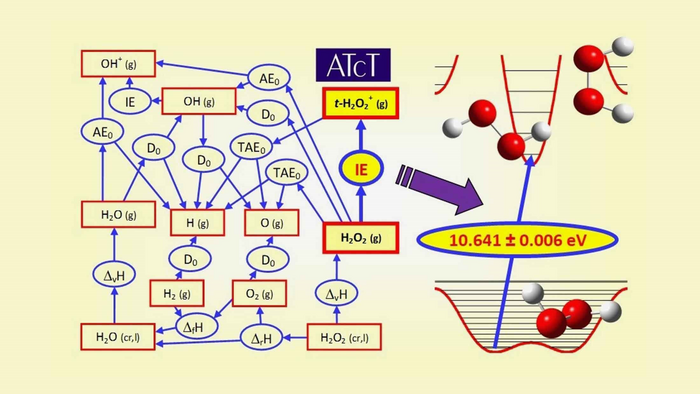The Active Thermochemical Tables join other highly regarded data resources in DOE’s Public Reusable Research Data.

Credit: (Image by Argonne National Laboratory.)
The Active Thermochemical Tables join other highly regarded data resources in DOE’s Public Reusable Research Data.
Over two decades ago chemist Branko Ruscic dreamt of a “superspreadsheet,” a giant database of thermochemical data that would be open to any interested scientist or engineer. Such data quantify the changes in energy and heat that occur during chemical reactions. They are essential, for example, in finding better ways to produce clean energy and for improving our understanding of climate change.
Ruscic is an Argonne Distinguished Fellow at the U.S. Department of Energy’s (DOE) Argonne National Laboratory. His dream is now very much a reality. His superspreadsheet, the Active Thermochemical Tables (ATcT), incorporates the results of collaborations with other Argonne scientists, as well as colleagues from academic institutions across the United States and around the world.
“The end result of ATcT is thermochemistry based on optimal use of all the available knowledge. This approach could make conventional tabulations of thermochemical values obsolete.” — Branko Ruscic, Argonne Distinguished Fellow
In March of this year, the DOE Office of Science announced it has designated ATcT as DOE Public Reusable Research (PuRe) Data. The ATcT platform thus joins other stellar DOE data resources. These resources include databases on materials for energy storage and other applications, ground-based atmospheric measurements, genome sequences, particle physics and more. As a result, scientists are able to more easily analyze, compare against and build upon this data, accelerating the pace of discovery in many different fields.
“The availability of high-quality thermochemical values is critical in many areas of chemistry, including industrial processes,” said assistant chemist David Bross, who also contributed to the ATcT development. These values are used in developing realistic predictive models of complex chemical environments, such as combustion or the atmosphere. They are also employed in developing or improving sophisticated computational models of atomic structures involved in chemical reactions.
“The ATcT website presently attracts a quarter of a million unique visitors each year,” Ruscic said. “The most recent publicly available version provides thermochemical values for nearly 2,800 chemical species, and we are intensely working to expand it beyond 3,000 species.”
These thermochemical values are derived from all available experimental measurements as well as state-of-the art theoretical data. The ATcT approach exposes the maze of inherent interdependencies normally ignored by the conventional treatment. It allows a statistical analysis of the individual measurements that define a thermochemical network.
“Over a decade ago, we embedded our thermochemical network approach into software consisting of more than 50,000 lines of computer code,” Ruscic said. “The current version reflects more than 30,000 thermochemical determinations linked in our thermochemical network.”
The first thermochemical network used by the ATcT software addressed a chemically important subject. There was a need for a more precise value for the energy required for the breakdown of the bonds in water. This then led to a more precise value for the heat of formation of the hydroxy radical, a key chemical species in the atmosphere combining hydrogen and oxygen. Both of these values improved upon the existing data by a sufficient amount to change then current understanding of the chemical reactions involved in predictive modeling of the atmosphere.
“The end result of ATcT is thermochemistry based on optimal use of all the available knowledge,” Ruscic said. “This approach could make conventional tabulations of thermochemical values obsolete.”
This work was supported by the DOE Office of Basic Energy Sciences.
Argonne National Laboratory seeks solutions to pressing national problems in science and technology. The nation’s first national laboratory, Argonne conducts leading-edge basic and applied scientific research in virtually every scientific discipline. Argonne researchers work closely with researchers from hundreds of companies, universities, and federal, state and municipal agencies to help them solve their specific problems, advance America’s scientific leadership and prepare the nation for a better future. With employees from more than 60 nations, Argonne is managed by UChicago Argonne, LLC for the U.S. Department of Energy’s Office of Science.
The U.S. Department of Energy’s Office of Science is the single largest supporter of basic research in the physical sciences in the United States and is working to address some of the most pressing challenges of our time. For more information, visit https://energy.gov/science.




